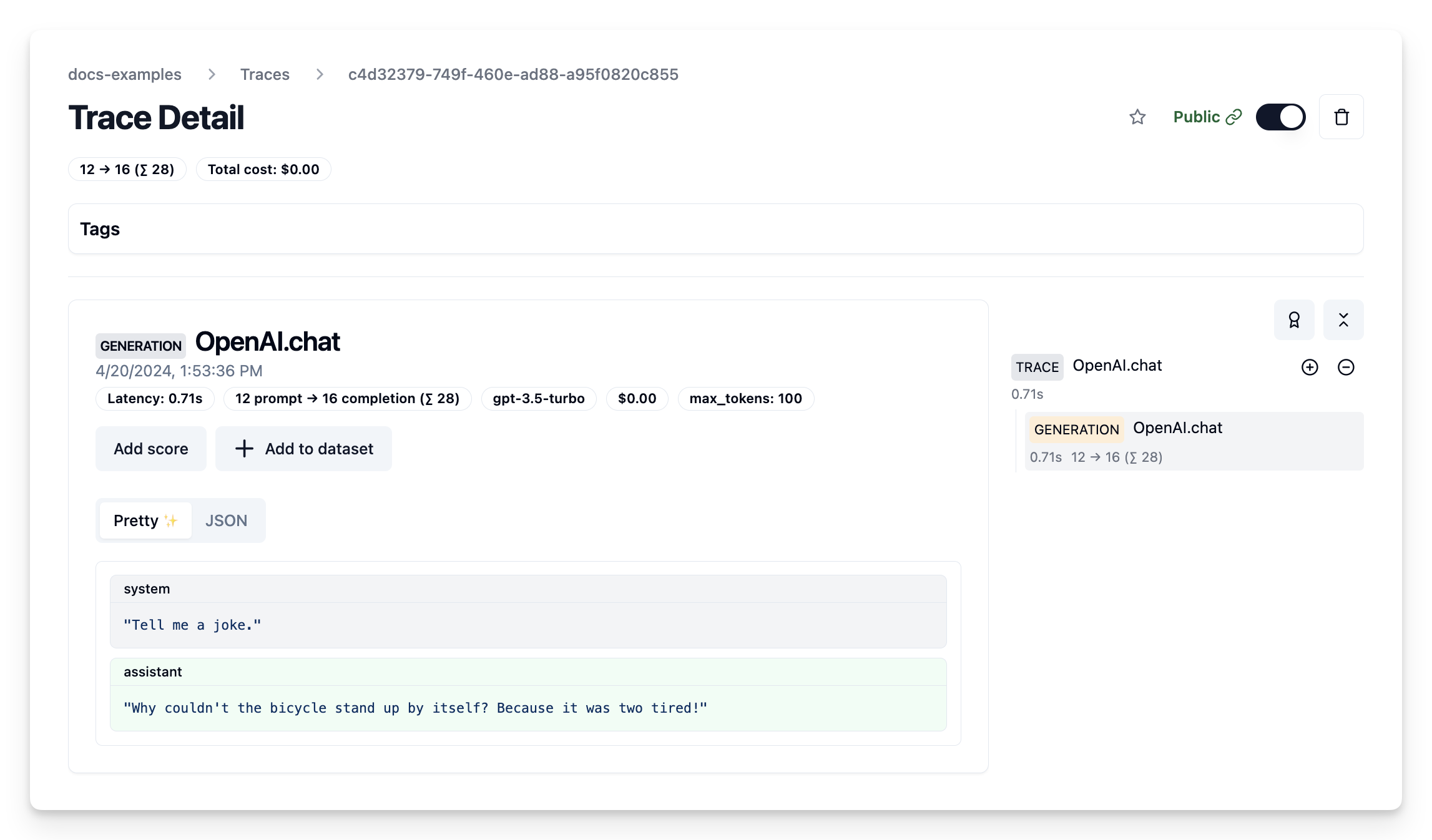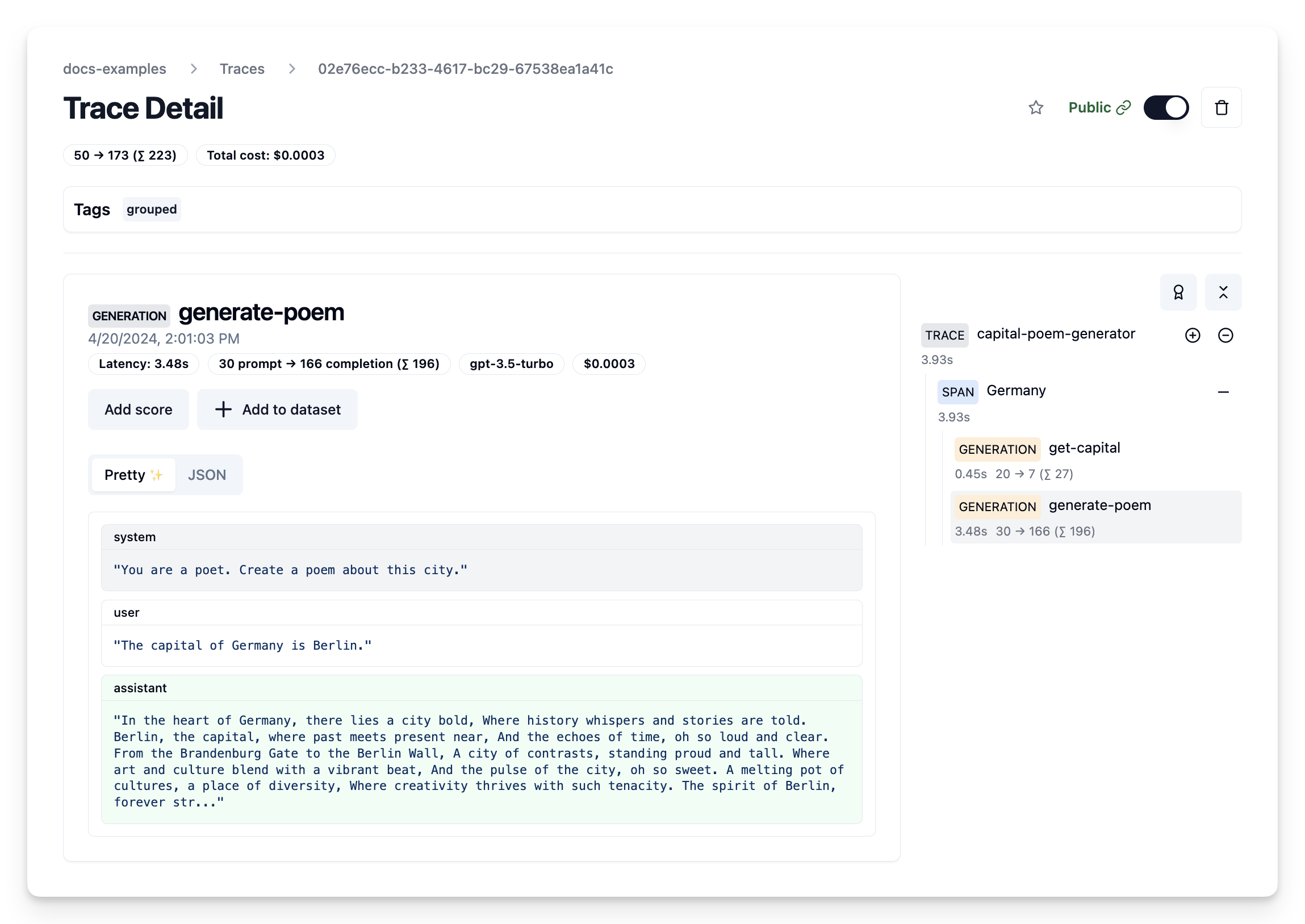Cookbook: OpenAI Integration (JS/TS)
This cookbook provides examples of the Langfuse Integration for OpenAI (JS/TS). Follow the integration guide (opens in a new tab) to add this integration to your OpenAI project.
Setup
The integration is compatible with OpenAI SDK versions >=4.0.0.
Note: This cookbook uses Deno.js, which requires different syntax for importing packages and setting environment variables.
import OpenAI from "npm:openai@^4.0.0";
import { observeOpenAI } from "npm:langfuse@^3.6.0";You can set the secrets either via (1) environment variables or (2) initParams:
1. Environment Variables
// Set env variables, Deno-specific syntax
Deno.env.set("OPENAI_API_KEY", "");
Deno.env.set("LANGFUSE_PUBLIC_KEY", "");
Deno.env.set("LANGFUSE_SECRET_KEY", "");
Deno.env.set("LANGFUSE_HOST", "https://cloud.langfuse.com") // For US data region, set this to "https://us.cloud.langfuse.com"// Initialize OpenAI client with observerOpenAI wrapper
const openai = observeOpenAI(new OpenAI());2. InitParams
import OpenAI from "npm:openai";
import { observeOpenAI } from "npm:langfuse";
const openai = observeOpenAI(new OpenAI({apiKey: ""}),
{clientInitParams: {
publicKey: "",
secretKey: "",
baseUrl: "https://cloud.langfuse.com", // Your host, defaults to https://cloud.langfuse.com
// For US data region, set this to "https://us.cloud.langfuse.com"
}});Examples
Chat completion
import OpenAI from "npm:openai";
import { observeOpenAI } from "npm:langfuse";
// Configured via environment variables, see above
const openai = observeOpenAI(new OpenAI());
const completion = await openai.chat.completions.create({
model: 'gpt-3.5-turbo',
messages: [{ role: "system", content: "Tell me a joke." }],
max_tokens: 100,
});
// notebook only: await events being flushed to Langfuse
await openai.flushAsync();
console.log(completion.choices[0]?.message.content);Public trace: https://cloud.langfuse.com/project/cloramnkj0002jz088vzn1ja4/traces/c4d32379-749f-460e-ad88-a95f0820c855 (opens in a new tab)

Chat completion (streaming)
Simple example using OpenAI streaming, passing custom parameters to rename the generation and add a tag to the trace.
import OpenAI from "npm:openai";
import { observeOpenAI } from "npm:langfuse";
// Initialize OpenAI SDK with Langfuse
const openaiWithLangfuse = observeOpenAI(new OpenAI(), { generationName: "OpenAI Stream Trace", tags: ["stream"]} )
// Call OpenAI
const stream = await openaiWithLangfuse.chat.completions.create({
model: 'gpt-3.5-turbo',
messages: [{ role: "system", content: "Tell me a joke." }],
stream: true,
});
for await (const chunk of stream) {
const content = chunk.choices[0]?.delta?.content || '';
console.log(content);
}
// notebook only: await events being flushed to Langfuse
await openaiWithLangfuse.flushAsync();Public trace: https://cloud.langfuse.com/project/cloramnkj0002jz088vzn1ja4/traces/7c7acc02-6129-448b-84d3-5973e0256175 (opens in a new tab)
Add additional metadata and parameters
The trace is a core object in Langfuse, and you can add rich metadata to it. Refer to the JS/TS SDK documentation and the reference (opens in a new tab) for comprehensive details.
Example usage:
- Assigning a custom name to identify a specific trace type
- Enabling user-level tracking
- Tracking experiments through versions and releases
- Adding custom metadata
import OpenAI from "npm:openai";
import { observeOpenAI } from "npm:langfuse";
// Initialize OpenAI SDK with Langfuse and custom parameters
const openaiWithLangfuse = observeOpenAI(new OpenAI(), {
generationName: "OpenAI Custom Trace",
metadata: {env: "dev"},
sessionId: "session-id",
userId: "user-id",
tags: ["custom"],
version: "0.0.1",
release: "beta",
})
// Call OpenAI
const completion = await openaiWithLangfuse.chat.completions.create({
model: 'gpt-3.5-turbo',
messages: [{ role: "system", content: "Tell me a joke." }],
max_tokens: 100,
});
// notebook only: await events being flushed to Langfuse
await openaiWithLangfuse.flushAsync();Public trace: https://cloud.langfuse.com/project/cloramnkj0002jz088vzn1ja4/traces/8c7ac9d0-ae3d-43cd-a69b-ef8ce888fd4a (opens in a new tab)
Function Calling
import OpenAI from "npm:openai";
import { observeOpenAI } from "npm:langfuse";
// Initialize OpenAI SDK with Langfuse
const openaiWithLangfuse = observeOpenAI(new OpenAI(), { generationName: "OpenAI FunctionCall Trace", tags: ["function"]} )
// Define custom function
async function getWeather(location: string) {
if (location === "Berlin")
{return "20degC"}
else
{return "unknown"}
}
// Create function specification required for OpenAI API
const functions = [{
type: "function",
function: {
name: "getWeather",
description: "Get the current weather in a given location",
parameters: {
type: "object",
properties: {
location: {
type: "string",
description: "The city, e.g. San Francisco",
},
},
required: ["location"],
},
},
}]
// Call OpenAI
const res = await openaiWithLangfuse.chat.completions.create({
model: 'gpt-3.5-turbo',
messages: [{ role: 'user', content: "What's the weather like in Berlin today"}],
tool_choice: "auto",
tools: functions,
})
const tool_call = res.choices[0].message.tool_calls;
if (tool_call[0].function.name === "getWeather") {
const argsStr = tool_call[0].function.arguments;
const args = JSON.parse(argsStr);
const answer = await getWeather(args["location"]);
console.log(answer);
}
// notebook only: await events being flushed to Langfuse
await openaiWithLangfuse.flushAsync();Public trace: https://cloud.langfuse.com/project/cloramnkj0002jz088vzn1ja4/traces/ef0a2a2c-e9b5-44cf-b984-4b184dc711a7 (opens in a new tab)
Group multiple generations into a single trace
Use the Langfuse JS/TS SDK to create traces or spans and add OpenAI calls to it by passing the trace/span as a parent to the observeOpenAI wrapper.
import Langfuse from "npm:langfuse";
import { observeOpenAI } from "npm:langfuse";
import OpenAI from "npm:openai";
// Init Langfuse SDK
const langfuse = new Langfuse();
// Create trace and add params
const trace = langfuse.trace({ name: "capital-poem-generator", tags: ["grouped"]});
// Create span
const country = "Germany";
const span = trace.span({ name: country });
// Call OpenAI
const capital = (
await observeOpenAI(new OpenAI(), {
parent: span,
generationName: "get-capital",
}).chat.completions.create({
model: "gpt-3.5-turbo",
messages: [
{ role: "system", content: "What is the capital of the country?" },
{ role: "user", content: country },
],
})
).choices[0].message.content;
const poem = (
await observeOpenAI(new OpenAI(), {
parent: span,
generationName: "generate-poem",
}).chat.completions.create({
model: "gpt-3.5-turbo",
messages: [
{
role: "system",
content: "You are a poet. Create a poem about this city.",
},
{ role: "user", content: capital },
],
})
).choices[0].message.content;
// End span to get span-level latencies
span.end();
// notebook only: await events being flushed to Langfuse
await langfuse.flushAsync();Public trace: https://cloud.langfuse.com/project/cloramnkj0002jz088vzn1ja4/traces/02e76ecc-b233-4617-bc29-67538ea1a41c (opens in a new tab)

Update trace
import Langfuse from "npm:langfuse";
import { observeOpenAI } from "npm:langfuse";
import OpenAI from "npm:openai";
// Init Langfuse SDK
const langfuse = new Langfuse();
// Create trace and add params
const trace = langfuse.trace({ name: "capital-poem-generator" });
// Create span
const span = trace.span({ name: "France" });
const capital = (
await observeOpenAI(new OpenAI(), {
parent: span,
generationName: "get-capital",
}).chat.completions.create({
model: "gpt-3.5-turbo",
messages: [
{ role: "system", content: "What is the capital of the country?" },
{ role: "user", content: "France" },
],
})
).choices[0].message.content;
const poem = (
await observeOpenAI(new OpenAI(), {
parent: span,
generationName: "generate-poem",
}).chat.completions.create({
model: "gpt-3.5-turbo",
messages: [
{
role: "system",
content: "You are a poet. Create a poem about this city.",
},
{ role: "user", content: capital },
],
})
).choices[0].message.content;
// Update span to get IO on span-level
span.update({input: capital, output: poem});
// End span to get span-level latencies
span.end();
// Update trace
trace.update({
name:"City poem generator",
tags: ["updated"],
metadata: {"env": "development"},
release: "v0.0.2",
output: poem,
});
// notebook only: await events being flushed to Langfuse
await langfuse.flushAsync();Public trace: https://cloud.langfuse.com/project/cloramnkj0002jz088vzn1ja4/traces/4a40e120-348f-4c22-bf16-453d5486f47a (opens in a new tab)
Get started
Follow the integration guide (opens in a new tab) to add this integration to your OpenAI project.